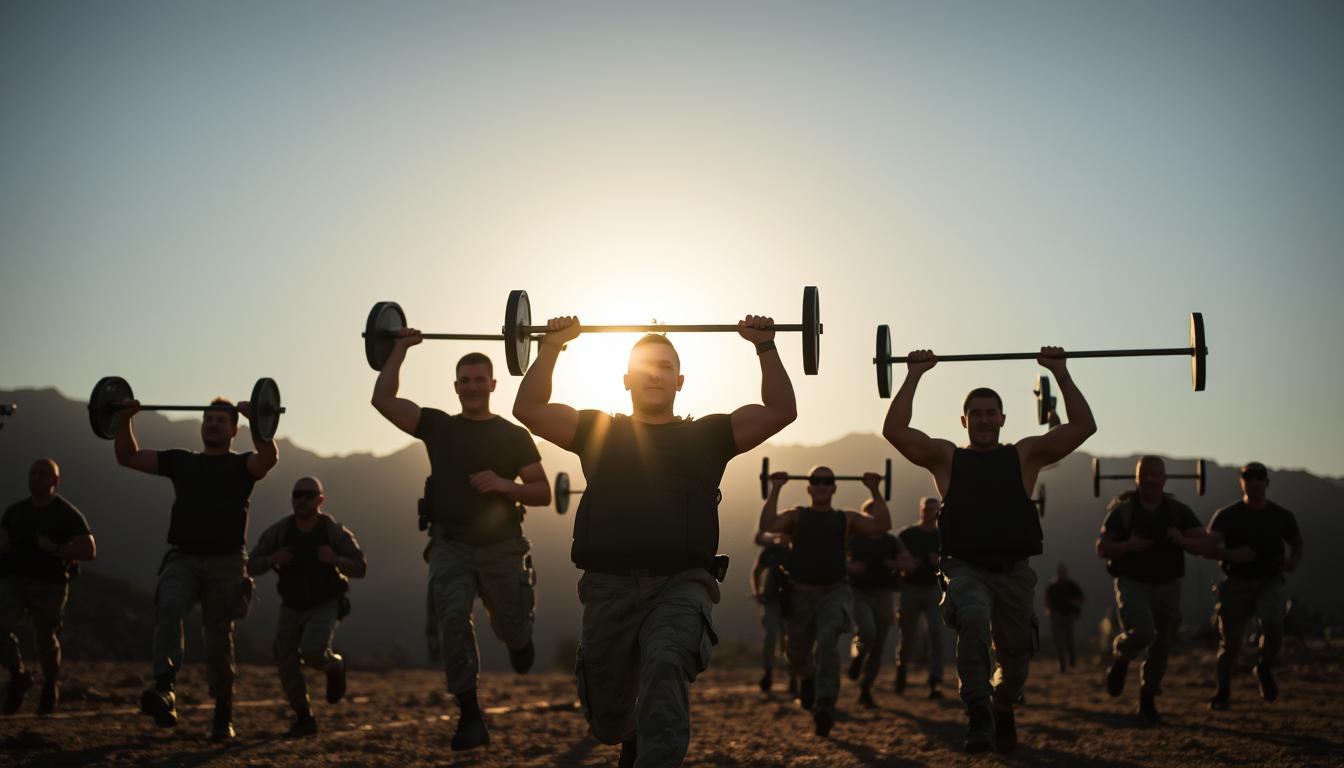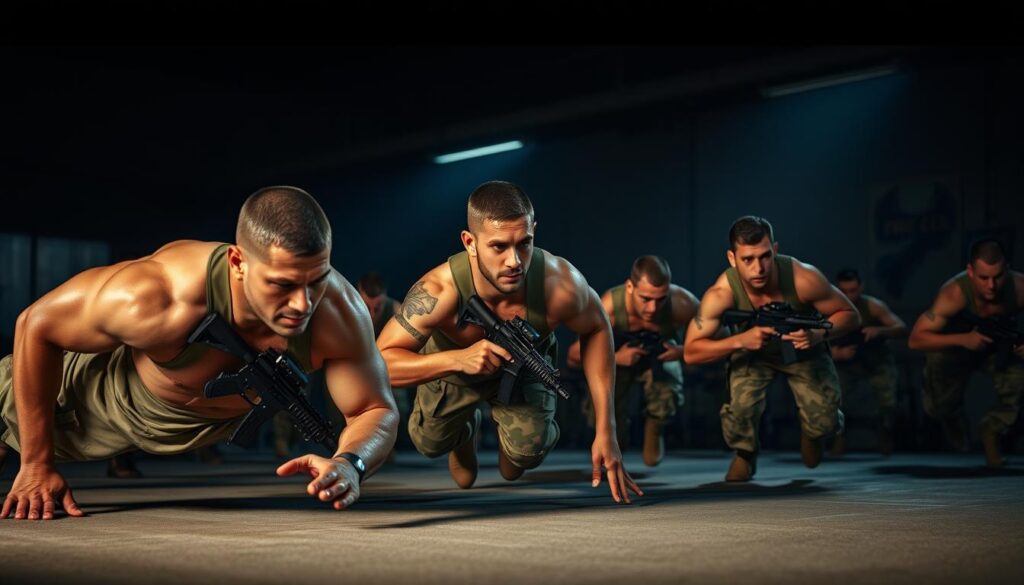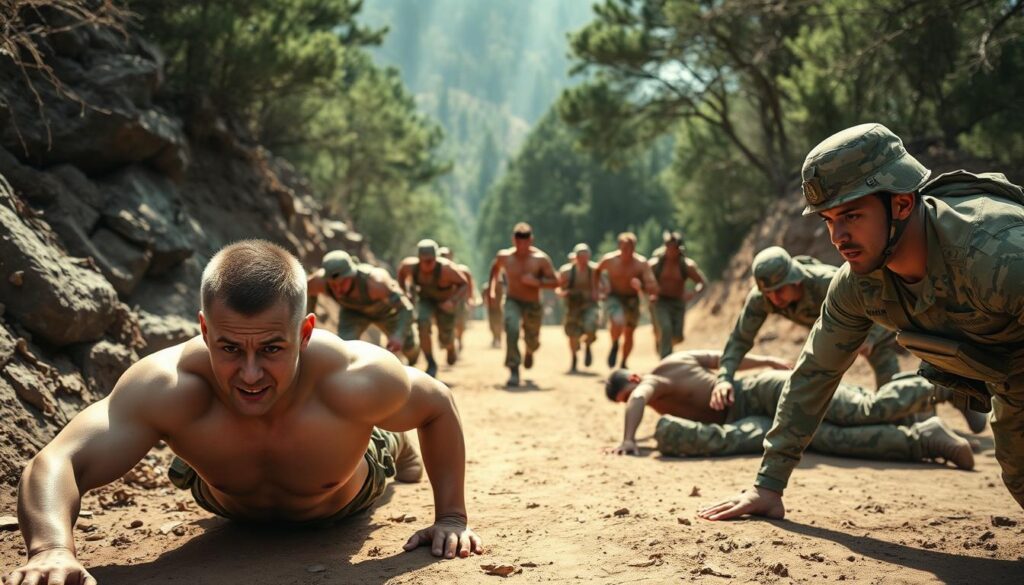Are you ready to push your physical limits and join the elite group of Special Forces operatives? The journey begins with understanding the rigorous fitness standards required to succeed.
The Army Fitness Test (AFT) is a key part of a soldier’s training. It checks their physical and mental health. The test includes events like the 3 Repetition Maximum Deadlift, Hand-Release Push-Up, Sprint-Drag-Carry, and Plank.
Mastering these fitness standards is key for soldiers aiming to join the Special Forces. Our guide will take you through the requirements. It will help you prepare for the challenges ahead.
Key Takeaways
- Understand the Army Fitness Test (AFT) and its significance
- Learn the events that make up the AFT
- Discover the importance of physical and mental well-being
- Get insights into the Special Forces selection process
- Prepare yourself for the rigorous training ahead
Overview of Army Special Forces
The Army Special Forces are a top team in the US Army. They go through tough training and can handle many missions. These include things like fighting in secret, helping local forces, and direct action.
Definition of Army Special Forces
Known as the Green Berets, the Army Special Forces are a special group. They learn to work in different places and know many skills. Their rigorous training tests their strength and brains, getting them ready for tough tasks.
They can sneak into enemy areas, teach local troops, and do direct actions. The selection process is very hard, with about 70% failing. This shows how tough it is to join.
Importance of Fitness Standards
The Army Special Forces need to be very fit. They have to pass tests like running 5 miles in 40 minutes and doing 28 hand-release push-ups. These tests help make sure they can do their jobs well.
“The physical training requirements for Special Forces are designed to push soldiers to their limits, testing their endurance, strength, and agility.”
Following special forces workout routines and physical training requirements is key. This training helps soldiers get the skills and shape needed for their missions.
| Fitness Test | Requirement | Time/Score |
|---|---|---|
| 5-mile Run | Complete the run | 40 minutes |
| 12-mile Ruck March | Complete with a 35lb ruck | 3 hours |
| Hand-release Push-ups | Complete the required number | 28 |
| 2-mile Run | Complete the run | 15:12 |
| Pull-ups | Complete the required number | 6 |
Passing these fitness tests is a big step for those wanting to join the Special Forces. It shows they can do their job and succeed in tough places.
Physical Fitness Requirements
Being physically fit is key for Army Special Forces training. You need strength, endurance, and agility to succeed. The training is tough, but it prepares you for Special Forces missions.
Strength Training
Strength training is a big part of Army Special Forces fitness. It helps build muscle, which is tested in events like the Maximum Dead Lift (MDL). You must perform well in these strength activities.
- Do exercises like squats, deadlifts, and bench press to boost muscle strength.
- Make sure to include strength training in your routine at least three times a week.
- Keep increasing the intensity of your workouts to keep getting stronger.
Endurance Training
Endurance training is also key for Special Forces. It includes rucking and running. These help improve your heart health and stamina.
- Do regular cardio like running or cycling to boost your heart health.
- Try interval training to improve your anaerobic endurance.
- Do rucking drills to strengthen your legs and boost endurance.
Flexibility and Agility
Flexibility and agility are also important for Army Special Forces. They help you stay mobile for your missions. Stretching and agility drills are good for these skills.
- Do dynamic stretching before workouts to boost flexibility.
- Add agility drills, like cone drills or ladder drills, to your routine.
- Work on your range of motion with stretching exercises.
By following military fitness test tips and doing elite soldier workouts, you can get ready for Army Special Forces training.
Assessment Tests for Candidates
The assessment process for Special Forces candidates is tough. It tests both physical and mental skills.
Army Physical Fitness Test (APFT)
The Army Physical Fitness Test (APFT) checks a candidate’s fitness. It includes push-ups, sit-ups, and a 2-mile run. Push-ups test upper body strength, sit-ups check core strength, and the 2-mile run looks at heart health.
Each event is scored, and the total score shows a candidate’s fitness level. The APFT is key, making sure candidates are fit enough to move on.
| Event | Minimum Score (Male) | Minimum Score (Female) |
|---|---|---|
| Push-ups (2 minutes) | 42 | 19 |
| Sit-ups (2 minutes) | 52 | 40 |
| 2-mile Run | 13:00 minutes | 15:26 minutes |
Special Forces Assessment and Selection (SFAS)
The Special Forces Assessment and Selection (SFAS) is tougher than the APFT. It tests physical and mental strength through rucking, land navigation, and brain tests.
Studies show that ruck march times and APFT scores matter a lot at SFAS. Brain tests also help figure out who will make it. This detailed test makes sure only the best candidates get into Special Forces training.
To do well, candidates need to follow strength and conditioning guidelines. They should focus on building endurance, strength, and agility. A good training plan is key for SFAS success and a career in Special Forces.
Comparison to Other Military Branches
Army Special Forces have tough fitness standards. But how do these compare to the Navy SEALs and Marine Corps? Knowing these differences is key for soldiers getting ready for their branch’s demands.
Navy SEALs Fitness Standards
The Navy SEALs have very high fitness standards. They include swimming, running, and other tough activities. A big part of their training is the swim test, where they must swim 500 yards in under 12.5 minutes.
They also do 42 push-ups in 2 minutes, 50 sit-ups in 2 minutes, and run 1.5 miles in 10.5 minutes or less. Swimming is a big deal for them, needing endurance and technique.
Candidates also face a tough obstacle course and other physical tests. These tests check their fitness and readiness.
Marine Corps Fitness Requirements
The Marine Corps has its own fitness tests, which are just as tough. The Marine Corps Physical Fitness Test (PFT) includes pull-ups or push-ups, crunches, and a 3-mile run. The pull-up test is especially hard, as they need to do as many pull-ups as they can in one set.
| Branch | Fitness Test Components | Minimum Requirements |
|---|---|---|
| Army Special Forces | 2-mile run, sit-ups, push-ups | Run in 13:45 minutes, 42 sit-ups, 42 push-ups |
| Navy SEALs | 500-yard swim, push-ups, sit-ups, 1.5-mile run | Swim in 12.5 minutes, 42 push-ups, 50 sit-ups, run in 10.5 minutes |
| Marine Corps | Pull-ups/push-ups, crunches, 3-mile run | Max pull-ups or 44 push-ups, 100 crunches, run in 28 minutes |
Even though the fitness standards differ, the goal is the same. It’s to make sure candidates are ready for their role. By knowing these differences, people can prepare better for what’s ahead.
Nutrition and Diet for Special Forces
For Special Forces soldiers, eating right is crucial. A balanced diet helps them stay fit for their tough missions.
Nutrition is key for Special Forces. The Army guides soldiers on what to eat. They need proteins, carbs, and fats for energy and recovery.
Importance of Nutrition
Good nutrition keeps soldiers at their best. It helps muscles grow and recover. This is vital for their training and missions.
The Army suggests a diet full of proteins, carbs, and fats. For more info, check out https://sfnationalguard.com/nutrition-for-special-forces-fueling-for-peak-performance/.
Recommended Dietary Guidelines
The Army advises a diet based on each soldier’s needs. This includes the right mix of nutrients for energy and recovery. For example, those heading to basic training can find Army weight standards at https://healthweightcalculator.com/preparing-for-basic-training-how-to-pass-the-army-weight-standard/.
A good diet for Special Forces includes:
- Lean proteins for muscle repair and growth
- Complex carbs for lasting energy
- Healthy fats for overall health and energy
By eating right, Special Forces soldiers can meet their high fitness standards.
Common Training Programs
Special Forces training focuses on building strength, endurance, and stamina. It prepares soldiers for the physical challenges of Special Forces operations.
Tactical Strength and Conditioning
Tactical Strength and Conditioning programs boost a soldier’s strength, power, and endurance. Experts say, “A well-structured TSC program can significantly enhance a soldier’s overall physical performance.” This includes strength training exercises tailored to the specific needs of Special Forces.
These programs are key for developing the physical skills needed for Special Forces operations. The focus is on functional strength that translates to real-world performance.
Endurance and Stamina Programs
Endurance and stamina programs are vital in Special Forces training. Activities like rucking and running improve a soldier’s ability to stay active over time.
“Endurance is not just about being able to run or ruck for a long time; it’s about being able to perform under stress and fatigue.”
These programs boost a soldier’s endurance, preparing them for the demands of Special Forces operations.
The Role of Mental Toughness
Mental toughness is key in Special Forces training. It helps make operatives well-rounded. It’s about being ready to handle high-pressure situations and dealing with stress and tiredness.
Building Resilience
Building mental resilience is crucial for success in Special Forces. It means facing tough conditions, like hard physical training. This builds grit and determination. For more on mental toughness, check out Military.com for tips and strategies.
Coping with Stress
Having good ways to cope with stress is vital in Special Forces training. Mental toughness helps improve performance. It also boosts the chances of doing well in the Special Forces Assessment and Selection process.



